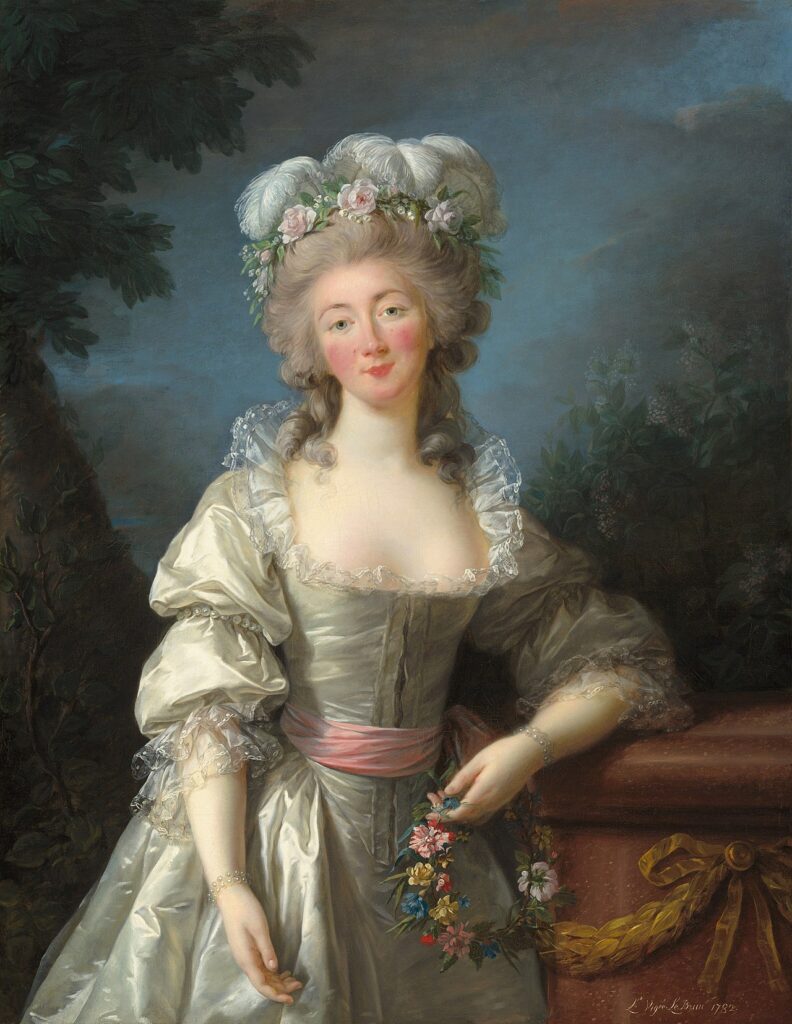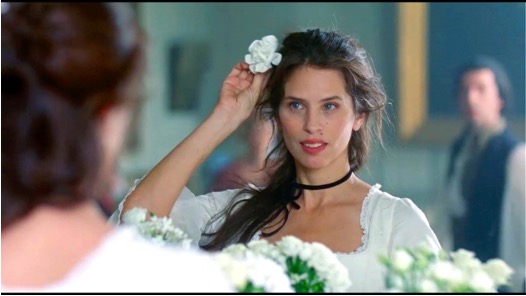Tracy Adams, University of Auckland, New Zealand and Christine Adams, St. Mary’s College of Maryland

Of all the things one could say about Jeanne Bécu, a.k.a Jeanne Vaubernier, later the comtesse du Barry, the least interesting is that she entered into a relationship with King Louis XV because he found her sexually attractive. Just as sex is the least interesting thing about relationships between French kings and their mistresses more generally, so it is the least interesting thing in this case. While it is true that stories of the aging Louis XV’s infatuation with the sexually experienced former courtesan titillated contemporary libellistes and subsequent historians, what is fascinating about the tradition of French royal mistresses is that so many kings of France relied on these women not primarily as sexual companions but as political advisers.1
It is therefore particularly discouraging to watch the Jeanne du Barry of Maïwenn Le Besco (who goes by Maïwenn) mug her way through the halls of Versailles as if she had stepped straight out of any number of eighteenth-century pamphlets and nineteenth-century histories that reduced her to a sexual stereotype. The last in a long line of politically significant French royal mistresses that stretches back to the late fifteenth-century, the real du Barry helped bring the Old Regime to its close, contributing to the demystification of royalty, nobility, and the court in the decades leading up to the Revolution. Unlike her predecessors, typically noblewomen stationed at court, her background had not prepared her to assume a political role: her mother worked as a seamstress and cook, her father may have been a monk. And yet, this enterprising young woman worked her way into the uppermost echelons of the French political world. Her beauty, intelligence, and grace attracted the dissipated comte Jean du Barry, who introduced her to France’s libertine elite, including the duc de Richelieu who reportedly brought her to the attention of the king. Guillotined as a traitor in December 1793, she embodied many contradictory traits, and her compelling if tragic story deserves a thoughtful re-telling in light of recent scholarship on factionalism at the royal court and the many roles that women played there.2 But Maïwenn, who directs the film and plays du Barry, fails to convey the real du Barry’s genuine significance. Instead, she fixates on her status as the king’s sexual partner and denies her any serious political engagement, producing an account that tracks closely with older popular histories, such as Edmond and Jules de Goncourt’s La du Barry (1878), when it doesn’t veer into fiction. Consequently, this sumptuously produced film, with its gorgeous cinematography and costumes, represents a missed opportunity.
Contemporaries regarded du Barry as less politically adept than her immediate predecessor, Jeanne-Antoinette Poisson, the Marquise de Pompadour, whose previous life in the Parisian salons had prepared her to play a central role in court politics (Pompadour’s own sketchy background was not quite as sketchy as du Barry’s). Pompadour famously received important courtiers at her daily toilette and advised on foreign affairs. Despite the limitations of du Barry’s education, she too came to immerse herself in political life. Undoubtedly, she struggled to navigate complex networks of court alliances for reasons, personal and structural, that are worth exploring. And yet, the film barely scratches the surface of her difficult, rich, and complicated life at court. Instead, sexual scandal stands in for the intricacies of court factionalism with du Barry gazing, bemused, at the sneering courtiers. The real du Barry’s crime was not her sexuality per se—no one begrudged the king a mistress—but the political activity that self-interested courtiers required of her and which was especially controversial because a woman of her background would not have been received at court under any other circumstances. Newcomers were always publicly introduced the first time they arrived at court, but other royal mistresses had been presented before the king developed an interest in them. Du Barry and Pompadour required official introductions after becoming involved with the king, introductions that were assigned, in both cases, to noblewomen who owed the king a favor. The princesse de Conti presented Pompadour in 1745, while the comtesse de Béarn did the honors for du Barry in 1769, in exchange for having her debts paid off and her sons promoted. The film depicts du Barry’s official presentation as a farce, and, while such rituals may seem ludicrous to modern eyes, surely the joke is too old and too obvious to require elaboration. Certainly du Barry herself would not have treated her introduction as an excuse to make faces and giggle at court protocol as Maïwenn’s character does—indeed, the historical record suggests that the much-delayed presentation came off without a hitch, in a dignified manner.3
In fact, the introduction episode could have served as a point of departure for exploring du Barry’s ambivalent status—ultimate insider, inevitable outsider—and her significance within a changing political culture as Enlightenment demands for greater transparency grew increasingly urgent over the course of the eighteenth century. The French king’s favorite had played an important political role for three centuries, but the opaqueness of politics more generally allowed her exercise of influence to be an “open secret.” This is why the duc d’Aiguillon (du Barry’s chief political ally, who, significantly, does not appear in the movie) sought out du Barry as soon as she appeared at court. In the film, her closest friend appears to be Louis’s valet, Jean-Benjamin de Laborde (an excellent Benjamin Lavernhe), who tutors her in the ways of Versailles—a relationship that has little support in the historical record. However, du Barry’s problematic past and lower-class origins drew attention to her presence at court, compromising the carefully cultivated invisibility that had so long facilitated the royal mistress’s political activity.
If Maïwenn’s du Barry appears occasionally with a book in her hand (although her literary interests seem to disappear once she is ensconced at Versailles), her chief activity seems to be sitting beside the king (played by American actor Johnny Depp) and enduring the taunts of cruel courtiers, especially the king’s grotesque, wicked-stepsister-like daughters. For the most part, the movie ignores the anti-du Barry machinations of the king’s foreign minister, the duc de Choiseul (Patrick d’Assumçao), who arranged the dauphin’s marriage with the Austrian princess, Marie Antoinette (convincingly portrayed by Pauline Pollmann), apparently considering them less interesting than the daughters’ viciousness. The disdain with which Louis XV’s daughters treated du Barry is historically attested, as are their efforts to encourage Marie Antoinette’s antipathy for the royal mistress. Also accurate is du Barry’s refusal to fight back and her pathetic eagerness for a kind word from the Austrian princess. Unfortunately, Marie Antoinette’s long refusal to speak to du Barry is represented without its proper context. A greater focus on the political would have highlighted the stakes of this genuinely interesting episode and clarified why it was so important for ambassador Mercy-Argenteau (inexplicably played by Micha Lescot as a simpering fool) to persuade the dauphine to accommodate du Barry and why the king himself insisted that she bend: insulting the king’s mistress risked lasting damage to French-Austrian diplomatic relations. Mercy worked hard to extricate Marie Antoinette from the influence of the royal sisters, so the dauphine’s decision finally to speak to du Barry in January 1772 was a key moment—although more so for French-Austrian relations than du Barry’s bruised feelings. Moreover, the build-up to the episode is presented without a hint of the pique that had led du Barry to ally with Aiguillon and the so-called “barriens,” and contribute to Choiseul’s downfall. The film, in its effort to highlight the sexual scandal of du Barry’s presence, neglects to demonstrate that Choiseul detested du Barry because, as an ally of an opposing faction, she represented a political threat. And Choiseul was right to feel threatened: he was sent into exile in December 1770.
It is true that the Choiseuliste faction encouraged the obscene libelles which, by attacking du Barry, played an important role in shaping the image of the king’s mistress and the king himself, who appeared as a man governed by his libido.4 The scurrilous literature that painted Louis XV as a weak king under the influence of a sexually experienced whore was less an indictment of du Barry, even if her origins caused consternation, than an attack on the very legitimacy of the monarch. But Maïwenn fails to consider that such sexual attacks were essentially political; polemicists had a long tradition of using sexual depravity as shorthand for political failings. Instead, she tries to suggest that du Barry’s sexuality represented adventurousness and freedom, which is not only banal but ahistorical, considering how little sexual agency a fille des rues would have had. At certain points in the movie Maïwenn does hint at the limited options of a woman of du Barry’s background: her complicated relationship with the comte du Barry (an effective Melvil Poupaud) and her confession that a life of galanterie is preferable to that of a working-class cook suggests as much. But for the most part that nuance is lost.
Most contemporaries (at least those who did not loathe du Barry) acknowledged that she was a nice person, often contrasting her with the vindictive Madame de Pompadour. Maïwenn makes du Barry sympathetic in a variety of ways, but some of her devices are baffling. For example, she draws on the tired female trope of the mother. Du Barry’s maternal relationship with Adolphe, the son of du Barry, is exaggerated for the sake of a tragic narrative arc. In the film, he dies in a duel in the early 1770s, although in reality this did not happen until 1778, four years after the death of Louis XV and du Barry’s expulsion from court. The real Adolphe du Barry was a page de la chambre du roi before 1765 and therefore did not benefit from du Barry’s patronage in that regard. To further underscore du Barry’s natural goodness (and maternal longing?), the film draws on her problematic relationship with Zamor, the Black child offered to her in a large gift box shortly after her court presentation. Her cringe-worthy treatment of him as a pet rings true, although the film also tries to suggest that du Barry was a kind person who saw Zamor as a human being and treated him more as her own child than a possession. The evil daughters of the king, in contrast, spout racist comments when du Barry and Zamor come for tea.
No historical film is easy to cast; finding the perfect actor to fill any role is difficult, if not impossible. That said, two key roles in Jeanne du Barry are stunningly miscast. First, the role of the dauphin, Louis-Auguste (the future Louis XVI), is played by a gangly young man sporting teen idol hair who shows touching, ahistorical kindness to his grandfather’s mistress. In reality, Louis XVI exiled du Barry to the convent of Pont-aux-Dames as soon as Louis XV died. Second, and even more distracting, is Maïwenn herself as du Barry. Maïwenn’s strong, sharp features, dark hair, olive skin, and lanky body in no way evoke the woman described by the Prince de Ligne and others as a breathtaking beauty with blond curls, blue eyes, and a large bosom. Élisabeth Vigée Lebrun’s famous painting of her couldn’t be more different from the very modern, slim, loose-haired and cosmetic-free Maïwenn du Barry; for a modern audience, her du Barry is beautiful, but it is unlikely that the French court would have found her attractive, much less “one of the loveliest women at court” in the words of the marquis de Belleval.


True, Maïwenn’s du Barry is marginally less vulgar than some earlier versions—certainly less so than Asia Argento’s boorish, burping incarnation in Sofia Coppola’s Marie Antoinette (2006). In fact, Maïwenn explains that she envisioned her portrayal of du Barry as a refutation of Argento’s, noting that she wasn’t crazy about the latter: “In Marie Antoinette, she’s scandalous and a tease. But in every book I read, she was described as being the complete opposite of that—distinguished, elegant, polite, altruistic, curious. I never read anything showing her to be provocative but it’s the shortcut history has taken to represent prostitutes in cinema. As if freedom could only be represented by provocation or vulgarity. Maybe it was time to contradict this idea.”5 The problem, however, is that in attempting to counter Coppola’s version of du Barry, Maïwenn simply reverts to more venerable tropes. In an October 2023 interview with Gregorio Belinchón of El País, she states that she prefers historical films that are “not dusty, that . . . shunned corseted dialogue. It is very noticeable when the director of a historical film has tried to please historians. I hope historians like my film, but it is not for them; history could not be my compass.”6 She may not have created her film for recent historians, but her promiscuous, free-spirited du Barry would have been recognizable to the Goncourt brothers and Charles Vatel, as well as eighteenth-century pamphleteers such as Pidansat de Mairobert.
In her effort to create a modern Jeanne du Barry, Maïwenn has created a film for nineteenth-century historians. That this is not a film for modern historians is unfortunate. Her du Barry could have been an interesting, fully realized historical figure rather than a nineteenth-century fiction with a sprinkling of modern sensibilities transported to Louis XV’s Versailles. By ignoring modern historians, Maïwenn recycles old stereotypes to leave audiences with a retrograde du Barry. Du Barry deserves a more serious film, one informed by recent scholarship that truly breaks with trite visions of female courtiers.
Notes
- We discuss this in detail in The Creation of the French Royal Mistress: From Agnès Sorel to Madame Du Barry (University Park: Pennsylvania State University Press, 2020). ↩︎
- For some recent studies that take female courtiers seriously, see, for example, Emmanuel de Waresquiel, Jeanne du Barry, une ambition au féminin (Paris: Tallandier, 2023); Flavie Leroux, L’autre famille royale. Bâtards et maîtresses d’Henri IV à Louis XVI (Paris: Passés composés / Humensis, 2022); and Caroline zum Kolk and Kathleen Wilson, eds., Femmes à la cour de France: Charges et fonctions (XVe – XIXe siècle) (Lille: Presses Universitaires du Septentrion, 2018). ↩︎
- Charles Vatel, Histoire de Madame du Barry d’après ses papiers personnels et les documents des archives publiques: précédées d’une introduction sur Madame de Pompadour, le Parc-aux-cerfs et Mademoiselle de Romans, 3 vols. (Versailles: L. Bernard, 1883), 1: 198-201. ↩︎
- Vatel, Histoire de Madame du Barry, 1: 148, 176–77; Robert Darnton, The Forbidden Best-Sellers of Pre-Revolutionary France (New York and London: W.W. Norton & Company, 1995), esp. chaps. 5 and 9. ↩︎
- Rebecca Leffler, “‘I wanted to work with him’: Maïwenn explains why she cast Johnny Depp as a beloved French king in ‘Jeanne du Barry,’” ScreenDaily, May 16, 2023, https://www.screendaily.com/features/i-wanted`-to-work-with-him-maiwenn-explains-why-she-cast-johnny-depp-as-a-beloved-french-king-in-jeanne-du-barry/5182012.article ↩︎
- Gregorio Belinchón, “Maïwenn: ‘Problems with Johnny Depp? There are tensions on every shoot,’” El País, October 2, 2023, https://english.elpais.com/culture/2023-10-02/maiwenn-problems-with-johnny-depp-there-are-tensions-on-every-shoot.html ↩︎
